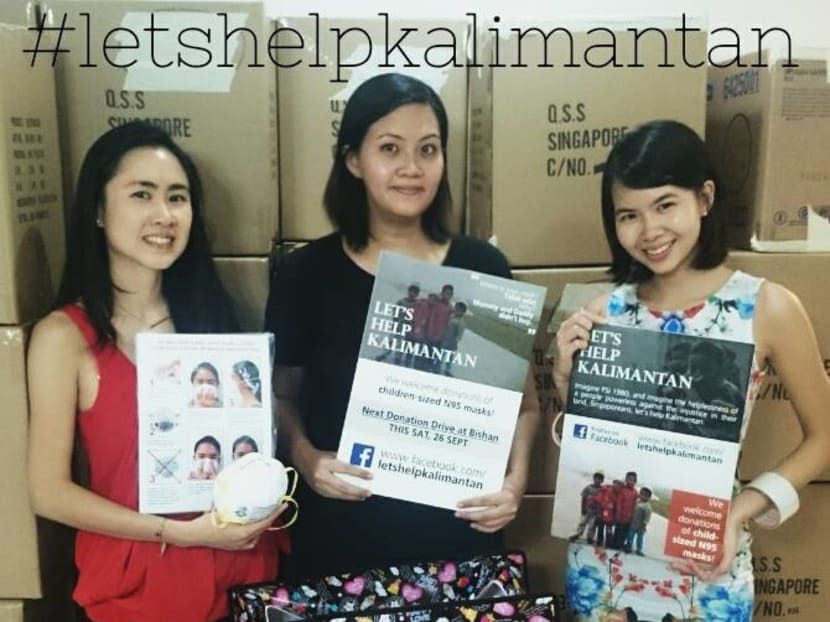S’pore volunteers to fly to Indonesia to help give out N95 masks
SINGAPORE — About a week after they launched a campaign to collect N95 masks to help those in Indonesia suffering from the choking haze, the organisers have collected more than 26,000 masks and will be flying to Kalimantan this weekend to distribute them with the help of an Indonesian non-governmental organisation (NGO).

Organisers behind the Let's Help Kalimantan initiative posing in front of boxes of N95 masks. Photo: Let’s Help Kalimantan/Facebook
SINGAPORE — About a week after they launched a campaign to collect N95 masks to help those in Indonesia suffering from the choking haze, the organisers have collected more than 26,000 masks and will be flying to Kalimantan this weekend to distribute them with the help of an Indonesian non-governmental organisation (NGO).
Unlike Singaporeans who can escape to a shopping mall when the haze reaches 200 or 300 on the PSI, Indonesians living in haze of over 2,000 have nowhere to go, said the organisers, who felt they had to act when reading news reports of the people’s plight there.
On Sunday (Oct 4), Ms Cheryl Lie, founder of the campaign “Let’s Help Kalimantan”, and three members of local NGO Relief.sg, including its CEO Jonathan How, will be flying to Palangkaraya, the capital of Central Kalimantan region, which has seen PSI levels hitting over 1,900.
The Singaporeans will be teaming up with two Indonesian NGOs — WALHI, and Justice, Peace, and the Integrity of Creation.
The group, who will be in Palangkaraya until Tuesday, will help to distribute masks and educate the residents on how to use them. They will also be speaking to affected communities to better understand their needs.
Ms Lie, 31, said she and her 26-year-old sister, who does events, felt compelled to help after seeing a news report on the severity of the situation in Kalimantan.
“We’re suffering, but the people in Kalimantan suffer 10 times more ... and social media has been heightening the response. Some people can just choose to be sympathetic, but I chose to act,” said Ms Cheryl Lie, a programmes manager at the Singapore Management University.
She had previously contributed to the relief efforts in the aftermath of the Nepal earthquake.
Together with their friend, secondary school teacher Hafizhah Jamel, 32, they launched the Facebook page called “Let’s Help Kalimantan”, calling for donations of N95 masks. Relief.sg’s Mr How subsequently joined their campaign.
The response to their campaign has been overwhelming, and the three women, together with Mr How, have collected more than 26,000 masks so far — far surpassing their original target of 10,000.
A group of private donors even had 10,000 masks delivered in boxes to Ms Hafizhah’s house.
Some donors would travel all the way to Ms Cheryl Lie’s workplace during rush-hour to pass boxes of masks, or drop off boxes at the team’s homes, recalled Ms Lie.
Others offered help in the form of free lorry services, and staff from NTUC FairPrice and Cold Storage even asked if they needed assistance in sponsorship of boxes.
The women also raised more than US$2,200 (S$3,160) from an Indiegogo campaign, and more than S$4,600 in cash donations. They will be using the money to order more masks in the coming week.
For the Kalimantan trip itself, Lion Air has agreed to waive the Singapore team’s excess luggage fees, while Relief.sg will be providing a small stipend for their meals.
“The response has been very heartening. I didn’t expect it to grow beyond our own circle… it’s a bit more than I can handle actually,” said Ms Lie, adding that the last few days have been a hectic rush of handling the logistics and juggling their day jobs.
Currently, the team is waiting to hear if SilkAir and DHL can provide free shipping for the second batch of masks.
Acknowledging the complexity of the situation, Ms Lie said more education and awareness of the issue is needed. She added: “We Singaporeans are very (lucky), we have knowledge of the PSI levels at our fingertips, knowledge about the health hazards… But this hasn’t translated to Kalimantan just yet.”






